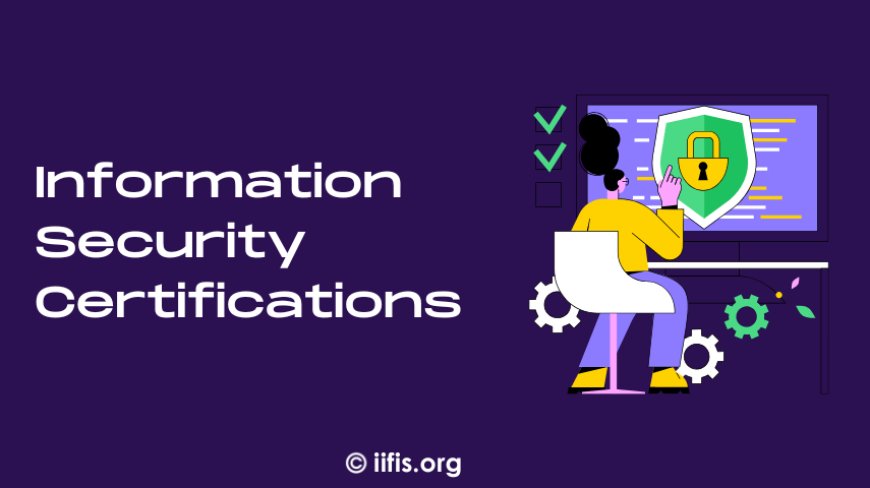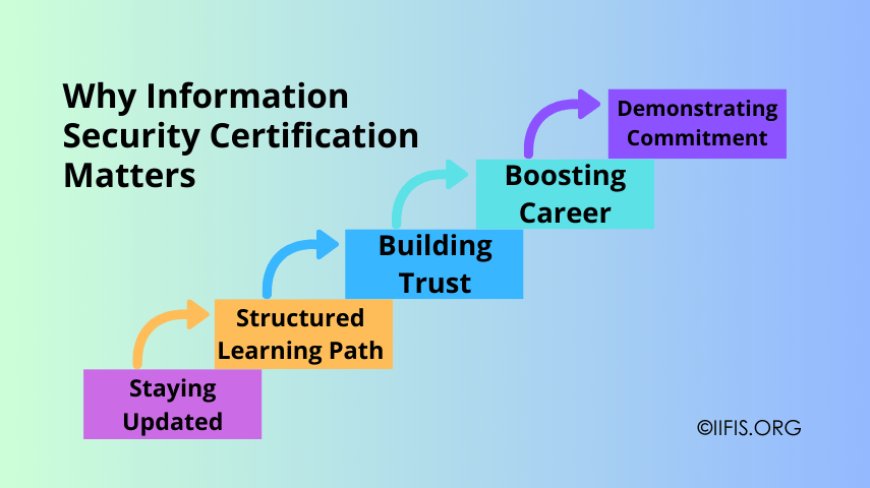Why Information Security Certification Matters
Discover why an Information Security Certification is essential for career advancement, protecting data, and meeting industry standards. Learn how certification validates skills and opens doors in the cybersecurity field.

In today’s digital world, where cyber threats are constantly evolving, having a strong foundation in information security isn’t just beneficial; it’s essential. For professionals working to safeguard sensitive data and protect organizations from malicious attacks, information security certifications have become a key differentiator. These certifications not only validate your skills and knowledge but also demonstrate your commitment to staying current in an ever-changing field. From enhancing job prospects to building credibility and fostering trust, pursuing info security certifications can open doors to opportunities and elevate your career. But why exactly does certification matter so much in this field? Let’s dive into the reasons why earning an information security certification is more than just a credential—it’s a pathway to impact, innovation, and resilience in cybersecurity.
The Role of Information Security in Modern Organizations
Importance of Securing Sensitive Data and Infrastructure
In today’s digital landscape, organizations face constant threats to sensitive data and critical infrastructure. Robust information security protects against data breaches, prevents financial loss, and ensures compliance with regulations, safeguarding the organization’s reputation and assets.
How Certifications Fit into the Cybersecurity Strategy
Certifications play a key role in cybersecurity strategy by ensuring team members have up-to-date skills to manage and respond to complex threats. Certified professionals bring proven expertise in handling security incidents, assessing risks, and implementing protection measures aligned with industry standards.
Benefits of Having Certified Professionals
Having certified professionals in an organization boosts trust, ensures compliance, and strengthens the security posture. Certified staff are equipped with knowledge of the latest threats and best practices, enabling proactive defense and enhancing the organization’s resilience to cyberattacks.
What is an Information Security Certification?
An information security certification is a credential that validates a professional’s knowledge and skills in cybersecurity. These certifications serve as a benchmark, proving expertise in specific areas such as risk management, ethical hacking, or network security, and ensuring professionals stay current with industry standards.
Purpose of Information Security Certifications
The purpose of these certifications is to:
-
Demonstrate Competence: Show employers and clients that the certified individual has met established standards in cybersecurity.
-
Enhance Skills and Knowledge: Provide structured learning in specialized areas to ensure professionals are prepared to manage and mitigate cyber risks.
How Certifications Validate Skills and Knowledge
Certifications validate technical and strategic skills through rigorous exams and practical assessments. For example, a certification in network security tests knowledge of protocols and configurations, while ethical hacking certifications focus on vulnerability exploitation techniques, ensuring the certified individual can handle real-world cybersecurity challenges.
Common Types of Certifications and Focus Areas
-
Network Security: Certifications like CompTIA Security+ and Cisco’s CCNA Security cover networking fundamentals and secure configurations.
-
Ethical Hacking: Certifications like CEH (Certified Ethical Hacker) focus on penetration testing and identifying vulnerabilities.
-
Governance and Risk Management: Certifications like CISSP and CISM cover strategic areas like governance, risk management, and policy development, ideal for managerial roles.
These certifications build a specialized, comprehensive skill set, enhancing both personal and organizational cybersecurity capabilities.
Why Information Security Certifications Matter

1. Credibility and Trustworthiness
-
In a trust-driven industry, certifications help professionals build a reputation by showing a commitment to high standards. Certified professionals are trusted to handle sensitive data and critical systems with integrity and reliability.
-
Industry Standards and Best Practices
-
Certifications demonstrate knowledge of globally recognized practices, like those set by NIST or ISO. They ensure professionals are aligned with the latest cybersecurity frameworks and methodologies, essential for maintaining effective security.
-
Compliance and Legal Requirements
-
Many industries require certified personnel to meet compliance standards such as ISO, GDPR, or CMMC. Certifications help organizations adhere to these regulations, reducing legal risks and protecting customer data.
-
Skill Validation and Competency
-
Certifications provide measurable proof of expertise, ensuring professionals are up-to-date and competent in specific cybersecurity areas. This validation builds confidence among employers and clients that certified professionals are equipped to handle evolving threats.
Information security certifications are vital for establishing trust, meeting compliance standards, and ensuring that professionals maintain the skills necessary to protect modern organizations.
Benefits of Information Security Certifications
-
Career Advancement
-
Certifications pave the way to higher-level roles like security analyst and cybersecurity manager, broadening career opportunities.
-
Increased Earning Potential
-
Certified professionals earn higher salaries and enjoy better benefits, as organizations value their specialized skills.
-
Job Security
-
High demand for certified talent ensures job stability, especially with the current cyber skills gap.
-
Professional Growth
-
Certifications keep professionals competitive and up-to-date, fostering continuous learning and confidence in tackling evolving cybersecurity challenges.
In short, certifications boost career growth, earnings, and stability in a high-demand field.
How Certifications Benefit Organizations
-
Improved Security Posture
-
Certified employees bring advanced skills to mitigate risks and strengthen the organization’s security defenses.
-
Client Confidence and Business Reputation
-
Certifications showcase a commitment to data protection, enhancing client trust and business reputation.
-
Faster Compliance and Regulatory Adherence
-
Certified staff simplify compliance with industry standards, making regulatory processes more efficient.
-
Risk Mitigation and Crisis Readiness
-
Trained employees can quickly identify, manage, and respond to potential threats, reducing the impact of security incidents.
Types of Information Security Certifications to Consider
-
Certified Information Systems Security Professional (CISSP):
Focuses on general security management, ideal for strategic roles. -
Certified Ethical Hacker (CEH):
Emphasizes ethical hacking and penetration testing for proactive threat detection. -
Certified Information Security Manager (CISM):
Covers security governance and risk management, suited for leadership roles. -
CompTIA Security+:
Entry-level certification providing foundational cybersecurity skills.
Choosing the right certification depends on career goals and the organization's specific security needs, from governance to hands-on threat testing.
How to Choose the Right Certification
-
Assess Career Goals and Industry Demands
-
Identify certifications that align with your career aspirations and roles in demand within your industry.
-
Research Certification Paths and Requirements
-
Consider each certification's experience, skills needed, and costs to find the best fit for your current level and budget.
-
Consider Employer Expectations
-
Review preferred certifications in job listings to understand what employers in your target field value most.
Preparing for Certification Exams
-
Effective Study Techniques and Resources
-
Use a mix of study materials, from online courses to textbooks, for comprehensive coverage of the exam topics.
-
Hands-on Labs and Real-World Practice
-
Engage with labs and simulations to gain practical skills and prepare for real-world scenarios.
-
Balancing Study Time
-
Set a realistic schedule to balance study with work or personal life, ensuring consistent progress.
Certification Maintenance and Continuous Learning
-
Recertification and Staying Current
-
Regularly renew your certifications to maintain their relevance and ensure they reflect your skills.
-
Continuous Learning
-
Stay updated on new threats and technologies to keep your skills relevant in a rapidly evolving field.
-
Leverage Certification Networks
-
Engage with certification communities for career advice, continuing education, and staying informed on industry trends.
Ongoing learning and network engagement are essential for maintaining expertise and career growth.
Information security certifications, such as those from the International Information Systems Security Certification Consortium (IIFIS), are essential for career growth and organizational security. These credentials validate expertise, boost earning potential, and build a strong network of industry peers. For organizations, certified professionals mean improved security and compliance.
For cybersecurity professionals, certifications tailored to their goals whether in ethical hacking or security management improve skills and job security. As digital threats rise, certified experts play a crucial role in safeguarding data and systems, making certification a valuable investment for individuals and businesses alike.























